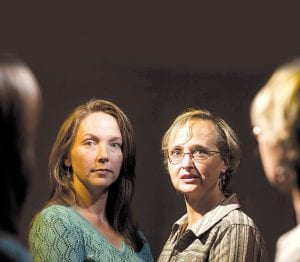“If tough had anything to do with it, my mom wouldn’t have had a mental illness.” That’s one of the first lines in a documentary film called Look It in the Eye recently produced by filmmaker Dan Woods of Superior for the Human Development Center (HDC),
nonprofit mental health agency with offices in five Northland counties, including one in Grand Marais.
A preview of the film was shown at North Shore Hospital on September 10 in order to publicize an upcoming 18-week TV series—called Speak Your Mind— on local PBS channel 8.1 (WDSE). The purpose of the series, which will be aired live and will include interviews with people who have struggled with mental health issues, is to promote openness and reduce stigma sometimes associated with having a diagnosis or getting treatment. Theseries will begin on Thursday, September 30 at 7:30 p.m., and it will feature the 30-minute documentary.
The movie documents two HDC clients whose lives have been affected by mental illness. One, whose name is Ginger, lost her mother to suicide when she was a child. No one in her family had known at the time exactly what kind of illness they were dealing with or how to find help for her mother. The other, named Tani, became seriously depressed after the birth of her second child. Eventually, she developed symptoms of biopolar disorder, although she didn’t understand what was wrong until a friend helped her realize that she had a fairly common mental illness.
At one of two screenings in Grand Marais were people in who health care professions, administration, education, and local government. One of the
administrators at the screening
n Fund of Comm said she appreciated how the movie normalizes mental illness as a disease like diabetes or heart disease.
One person said that many of the health care employees he works with could benefit from mental health services for themselves or their family members, and he wishes they would take better advantage of employee assistance programs that are available.
Another person told a story about a community member who was diagnosed with depression by David Hilfiker at Sawtooth Mountain Clinic 40 years ago, when mental health issues were not as well understood as they are today. Back then, if someone had a mental health crisis, it was often called a “nervous breakdown.” Medications stabilized the community member, who recently told the person at the screening, “Dr. Hilfiker saved my life.”
One health care administrator said she appreciated the story about the woman who did not struggle with postpartum depression until after the birth of her second child. It was a good example of how a person can function without any problems and then be hit unexpectedly with a mental health challenge, she said.
The woman in the movie, Tani, did not seek treatment right away but eventually went into therapy, started taking medication, and learned that those things along with exercising and getting outside work together to help her stay healthy.
HDC Development Director Kim Matteen pointed out how family members can be deeply affected by someone else’s illness, as Ginger was in the movie. They can benefit from treatment as well. She pointed out that Tani’s husband learned that he can help identify when things aren’t going as well for his wife but that he can’t fix things for her.
“I think the social stigma is still very strong,” said one community member. He thinks stigma keeps people from getting the help they need.
HDC’s slogan is, “Mental health issues affect everyone, Shouldn’t you know more?” Local HDC staff members are available to show Look It in the Eye to community groups and facilitate discussion afterwards.
Therapist Jerry Lilja would like to see clubs, church groups, and workplaces take this opportunity to open up dialogue about mental health issues.
The show will be hosted by Duluth television newscaster Pat Kelly and licensed psychologist Carolyn Phelps. The first Thursday will focus on depression and will include interviews with people whose lives have been affected by depression as well as a panel of experts who will address the issue. Each week of the television series will feature a different mental health topic, from stress and anxiety to the effect of biology and environment on the development of mental health disorders.
More information, as well as several self-assessment screening tools that can be taken anonymously, can be found online at www. humandevelopmentcenter.org. Thelocal HDC phone number is (218) 387-9444.



Leave a Reply